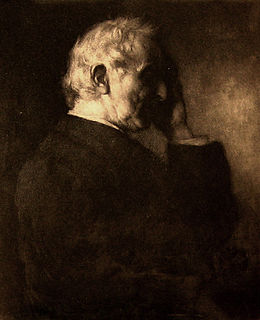A Quote by Henry James
...the great merit of the place is that one can arrange one's life here exactly as one pleases...there are facilities for every kind of habit and taste, and everything is accepted and understood.
Quote Topics
Related Quotes
No one can bar me from joyfully proceeding on what the great masters have left us; after all, to rediscover everything again, should be understood to be unfounded. But one should however proceed on merit, and not simply repeat wat was. All genius, sincere, deserves his place, even though maybe later in life.
In Paris style is everything. That is traditionally understood. Every street, every structure, every shopgirl has style. The style of Parisian architecture has been proved and refined by at least three centuries of academic dictates and highly developed taste. There are few violations of this taste, and there is exemplary architectural consistency. Paris has defined the aesthetics of a sophisticated urban culture.
The provision of health care facilities must be accepted as a social responsibility. It is not that an individual who has the misfortune to be inflicted with some particular disease is solely responsible for searching the facilities to cure his illness. This is a social responsibility which is accepted by governments all over the world. This is part and parcel of the organization of individuals into societies. It is a measure of the degree of civilization.
This is our dilemma--either to taste and not to know or to know and not to taste--or, more strictly, to lack one kind of knowledge because we are in an experience or to lack another kind because we are outside it. [. . .] Of this tragic dilemma myth is the partial solution. In the enjoyment of a great myth we come nearest to experiencing as a concrete what can otherwise be understood only as an abstraction.
A good taste in art feels the presence or the absence of merit; a just taste discriminates the degree--the poco piu and the poco meno. A good taste rejects faults; a just taste selects excellences. A good taste is often unconscious; a just taste is always conscious. A good taste may be lowered or spoilt; a just taste can only go on refining more and more.
I've loved hip-hop all of my life, but there came a time in my life when my entire life had a shift: where, before, I was just kind of going to church every now and then; then, there was an actual change, where I actually understood who Jesus was, actually understood the message of the Gospel, and my entire life changed.
But you go to a great school, not for knowledge so much as for arts and habits; for the habit of attention, for the art of expression, for the art of assuming at a moment's notice a new intellectual posture, for the art of entering quickly into another person's thoughts, for the habit of submitting to censure and refutation, for the art of indicating assent or dissent in graduated terms, for the habit of regarding minute points of accuracy, for the habit of working out what is possible in a given time, for taste, for discrimination, for mental courage and mental soberness.
I believe in an America where the rights that I have described are enjoyed by all, regardless of their race or their creed or their national origin - where every citizen is free to think and speak as he pleases and write and worship as he pleases - and where every citizen is free to vote as he pleases, without instructions from anyone, his employer, the union leader or his clergyman.
In India, [in] the great documents like [the] Upanishads in eighth century B.C., you find some of the wisest [women] making great, learned speeches and then you worship them, but actually don't do very much about girls' education generally. So I think there has been a kind of dual presence of pain, respect, and saying you are great, etc., but not providing the basic facilities that make women able to lead the kind of life that they would like to and that men easily do.
A man follows the path laid out for him. He does his duty to God and his King. He does what he must do, not what pleases him. God's truth, boy, what kind of world would this be if every man did what pleased him alone? Who would plough the fields and reap the harvest, if every man had the right to say, 'I don't want to do that.' In this world there is a place for every man, but every man must know his place.







































